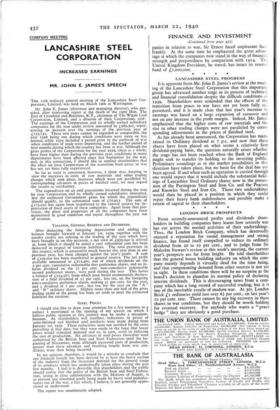COMPANY MEETING
LANCASHIRE STEEL CORPORATION
Tim ioth ordinary general meeting of the Lancashire Steel Cor- poration, Limited, was held on March 19th at Warrington.
Mr. John E. James (chairman and managing director), who pre- sided, after expressing regret at the death of the right Hon. The Earl of Crawford and Balcarres, K.T., chairman of The Wigan Coal Corporation, Limited, and a director of their Corporation, said: The earnings of the Corporation and its wholly owned subsidiary companies for the year under review amounted to £989,301, repre- senting an increase over the earnings of the previous year of £133,741. These two years cannot be regarded as comparable, the year 1938 being one during which conditions were more or less normal, while 1939 included a period prior to the outbreak of war when conditions of trade were improving, and the further period of four months during which the country has been at war. Although the gross profits of the Corporation for the year 1939, taken as a whole, have been higher than during the previous year, conditions in many departments have been affected since last September by the war, and, in this connection, I should like to remind shareholders that the effect on your Corporation of the transition from peace to war has not yet been fully experienced.
So far as 1939 is concerned, however, I think that, keeping in view the increases in costs of raw materials and other trading charges which took place, increases which were not paralleled by corresponding advances in prices of finished steel, we may regard the results as satisfactory.
The expenditure on air raid precautions incurred during the year by your Corporation and its wholly owned subsidiaries amounted, less the estimated Government grant for which the expenditure should qualify, to the substantial sum of £70,953. The sum of £175,000 has again been transferred to the central reserve for de- predation of fixed assets of these companies. Apart from that pro- vision, the plant and properties of all the companies have been maintained m good condition and repair throughout the year out of revenue.
TAXATION, GENERAL RESERVE AND DIVIDENDS.
After deducting the foregoing depreciation and adding the balance brought forward at January 1st, 1939, together with the sundry credits not relating to the trading of the year which have been brought in on this occasion, a net total of £959,242 is arrived at, from which it should be noted a very substantial sum has been deducted in respect of taxation liabilities. The total provision in this respect, which is necessarily much heavier this year than in any previous year, has been charged against the year's profit. A sum of Ltoo,000 has been transferred to general reserve. The net profit available amounted to £313,461, out of which dividends on the 5 per cent. cumulative redeemable first preference shares, and an in- terim dividend on the 5i per cent. non-cumulative redeemable second preference shares, were paid during the year This leaves a balance of £254,567, from which your board recommends declara- tion of a final dividend of 21 per cent., less tax, on the foregoing non-cumulative preference shares, making 5f per cent. for the year, and a dividend of 7 per cent., less tax, for the year on the " A " and " B " ordinary shares. Slightly more than one half of the gross trading profit of the group has been set aside to meet the estimated liabilities for taxation.
STEEL PRICES
I should also like to draw your attention for a few moments to a subject I mentioned at the opening of my speech on which I believe public opinion in this country may be under a misappre- hension. As shareholders will recollect, reductions in prices of semi-finished and finished steel products were made dating from January 1st, 1939. These reductions were not justified by the costs prevailing at that date, but they were made in the hope that lower prices would stimulate demand and so, in turn, assist in reducing the cost of production. No advances in steel prices thereafter were authorised by the British Iron and Steel Federation until the be- ginning of November, 1939, although increased costs of production, greater than these advances and resulting largely from war con- ditions, were then being incurred.
In my opinion, therefore, it would be a mistake to conclude that any financial benefit has been derived by at least the heavy section of the industry from the increased demand for the general range of its products which has undoubtedly taken place during the past few months. I feel it is desirable that shareholders and the public should realise that the policy of the British Iron and Steel Federa- tion, acting in close collaboration with the Minister of Supply, is to prevent any abnormal profit being made by heavy steel manufac- turers out of the war, a fact which, I believe, is not generally appre- ciated or understood.
The report was unanimously adopted.






































 Previous page
Previous page